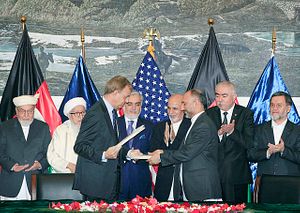General Abdul Rashid Dostum, once renowned as a strongman and fighter, is now emerging as a national Afghan politician, one whose vision extends far beyond his own Uzbek ethnicity. As first vice president, General Dostum has together with Sarwar Danish, an ethnic Hazara who is second vice president, formed a robust presence in the young administration of President Ashraf Ghani.
Since taking office, Dostum has made the effort to meet thousands of Afghans from different tribes around the country. Sadarat, an old palace that has traditionally served as offices for former prime ministers and other government officials, has been buzzing with major gatherings over the past six months. Since I began working as one of the vice president’s 13 advisors, I have witnessed thousands of people from more than 20 provinces arrive to visit him.
Of course, the most pressing issue for these visitors is security, an area where Afghan patience is being sorely tested. Dostum promises visitors that securing the country is the top priority. Other concerns raised include corruption, unemployment, poverty, instability and governance. These are all problems that need to be addressed by the national unity government. It is interesting to watch the general interact with different people. He is quite happy shaking hands with women, and welcomes them to key meetings. He never interrupts, and answers criticisms honestly. He is remarkably open with the public.
One thing I have noticed at these meetings is that people like Dostum for his honesty. Moreover, he will often pick up the phone during the meeting and call the relevant department to get a visitor’s problem solve. Once, a group from the Khamab district of Jowzjan were complaining about a group of armed men, who were extorting locals in the name of the National Directorate of Security. Dostum immediately called the provincial head of NDS and ordered that the men be disarmed, and soon they were.
Initiatives
While at the Sadarat compound, Dostum initiated a donor drive, asking the Ministry of Public Health to donate blood. He encouraged all his staff to donate for the Security Forces, injured soldiers, and needy patients, setting an example with his own donation. The campaign subsequently spread to the provinces, with thousands of people pouring into hospitals to declare their support for the Afghan National Security Forces and Dostum’s initiative. On phone calls with dozens of doctors around the country, I learned that hospitals had to stop accepting people, so enthusiastic was the response.
Like his visitors, Dostum is concerned about security issues, and particularly a recent spate of suicide attacks by insurgents in the capital. On hearing of an attack, he has been known to dash out to the scene, to the consternation of his security detail. I’ve seen him scold the former police chief of Kabul for the lack of security in the capital. I’ve also seen him visit the family of a university student who was killed in a bloody attack along Darulaman Road while carrying the holy Qu’ran. The shocked General consoled the family and assisted them financially.
In fact, Dostum has been working on a plan to secure Kabul from attacks, inviting invited all members of parliament from Kabul to share their opinions. Subsequently, he put to President Ashraf Ghani the proposition that a Kabul garrison be created. With the approval of the president, the garrison was formed, and the number of attacks in Kabul has fallen dramatically.
After the deadly Paktika attack, Dostum met with wounded civilians at the hospital and instructed the Ministry of Defense to transport critical patients to Turkey and India. Later, I received a call from his security guard, asking me to come to a supermarket near the general’s house. There I saw Dostum in his tracksuit looking for proper meals for the victims still in the hospital. The general instructed me and other staff to deliver the food items he had purchased to the hospital. Most of the Paktika victims were volleyball players. In response to the attack, Dostum created an Afghanistan sports festival called “Sports for All.”
Recently, General Dostum honored Reza Gul, an Afghan woman who had been successfully fighting Taliban insurgents in western Farah province, avenging her son who had been killed in a Taliban ambush. At Dostum’s behest, I invited Gul to Kabul, where the general awarded her the Malalai medal and instructed the governor of Farah to grant her a piece of land.
President Ashraf Ghani has announced plans for an “independent defense,” in recognition of the impending withdrawal of international forces. Afghan security forces have to defend their country themselves. In this respect, Dostum was tasked to manage a campaign to encourage the Afghan people to support their security forces. The campaign was a great success, starting with the general’s slogan #ISupportANSF, which took off on social and news media.
Meanwhile, Dostum invited the chairmen for the National Olympic Committee and the National Sports Federation to share ideas about creating a major festival to show the world that Afghan athletes are not afraid of terrorist threats. Through the festival, Dostum plans to send a message to the terrorists that they can’t stop youth progress in sports. The festival is scheduled for the autumn of this year.
When Taliban have laid down their arms, Dostum has been welcoming, as in the case of more than 200 Taliban under Mufti Nematullah in the Darzab district of Jowzjan who elected to join the peace process. “Let’s prove that we can serve our country,” Dostum told the men. Dozens more participated in this process the following day, declaring their support for the government in a ceremony held in the city of Shiberghan.
Sultan Faizy is media adviser to the first vice president of Afghanistan and is based in Kabul. He can be reached at [email protected]
































